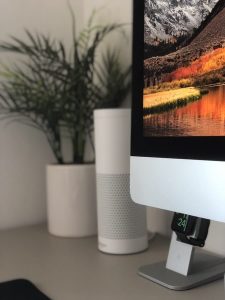Cecelia is 79 and a widow. She has some mobility issues due to an old car accident, but her health is generally good. Her three children, who live in other parts of the country, want her to move into an assisted living facility where she doesn’t have to go up and down the stairs, but Cecelia wants to stay in her own home for as long as possible. As a compromise, the kids had a stair lift installed and set up a home monitoring system that will notify them if Cecelia falls or if her movement around the house is out of the ordinary. Cecelia is happy that she can stay in her own home, and both she and her children have peace of mind knowing that if something happens to her when she is alone, her kids can call for help.
In our last article, we explored the way that technology presents challenges to our younger generations. In this article, we will examine various technologies that can benefit seniors and make life for them easier and more convenient, and even help improve their health.
Technology is revolutionizing the way we live, enabling us to accomplish tasks and achieve goals in ways we couldn’t have imagined years ago. Technology is also helping seniors age in place and stay in their own homes for longer than they might otherwise be able.
Some of the technologies making seniors’ lives better are:
• Virtual Reality. Virtual reality devices can enable seniors to travel to places they may not be able to go in the physical world. VR can also take seniors back in time. Dennis Lally, co-founder of Rendever, a VR platform, offers seniors the ability to revisit old places from childhood, a tool that can be invaluable for Alzheimer’s patients.
• Artificial Intelligence. Robot pets are being used as a tool to help dementia patients relax when anxious. Robots are also being developed to help provide care to seniors as they age. They won’t replace human caregivers, but they can help ease the burden that caregivers face.
•Home Assist Devices. These can include stairlifts and lift chairs; devices such as Google Home or Amazon Alexa, which offer voice control over lights, thermostats, door locks, and other devices. Seniors who have mobility issues can have more control over their environment with home assist devices. Google, Alexa, and other home assist devices can also remind seniors of important events like doctor appointments and when to take pills, create shopping and other lists, and provide a verbal interface with the internet (which can be especially helpful for those with vision problems).
• Home Monitoring Devices. These can include private camera systems and systems with sensors that track activity inside a house. This can send important data on seniors to their loved ones to let them know if mom hasn’t gotten up at her usual time or if dad is spending an unusual amount of time sitting instead of being active.
• GPS Trackers. These handy devices provide a location at all times for their owners, and offer help at the push of a button. Many now are able to detect someone falling and alert their loved ones or emergency services. Gone are the days when such devices were tied to a landline phone—many GPS trackers are now wearable as watches or jewelry, so help is available wherever a person may be.
• Communications. Video chat programs can enable seniors to stay in touch with their loved ones with live video communication. These programs are also being used by physicians and clinics for telemedicine, which can be a benefit for seniors who aren’t able to get out easily.
• Video games. They’re not just for children. Video games help engage seniors’ minds and can even help keep them physically active.
Seniors are living longer and fuller lives than the generations that came before them, and many of them want to stay at home for as long as possible. Innovations in technology are making this possible, allowing seniors more control over their lives and giving their families peace of mind knowing that if anything were to happen, help would be close at hand. Thanks to technology, the future for our seniors is brighter than ever.

